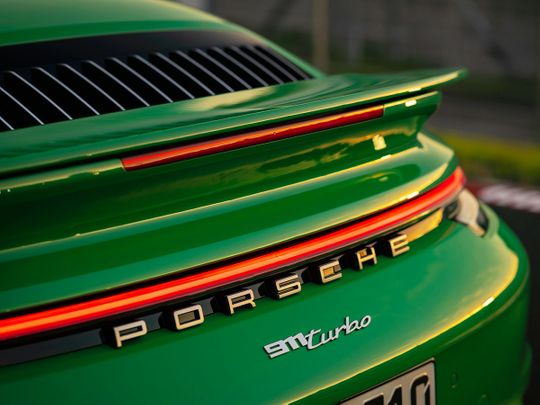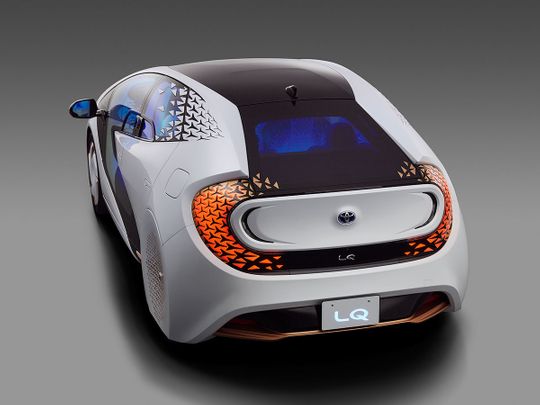GREEN CAPITALI$M
Can Porsche’s carbon-neutral 'e-gas' save the planet?
Carmaker launches effort to make "synthetic" fuel that could fuel any car's petrol engine
NAZI SYNGAS***


Porsche has no plan to make an electric version of its iconic 911 sports cars. So, how to ensure continued sale of its flagship model far into the future, when governments around the world, including California's, are planning to eventually ban sales of new internal combustion cars?
Porsche's answer: carbon-neutral "synthetic" gasoline that could fuel any car's gas engine, not just Porsches.
Through a new pilot project the German maker of high performance automobiles announced on Wednesday, windmills in Chile would provide electricity to turn water into hydrogen fuel and oxygen. As part of the same process, carbon dioxide would be filtered from the air. The hydrogen and carbon dioxide would be combined to form methane, to be reformulated as a gasoline substitute. Because the carbon dioxide was already in the air, the resulting tailpipe emissions would add no greenhouse houses to the atmosphere.
The aim is to "show what's technically possible," said Michael Steiner, head of Porsche research and development, so that so-called e-gas can be sampled by drivers and evaluated by regulators as governments crack down on greenhouse gases to address climate change.
The technologies that underlie the Porsche project are already proven and well understood. Water has been turned into hydrogen and oxygen for decades, through the process of electrolysis. Engineers have decades of experience turning methane into gasoline-like fuel as well. The increasing capacity of solar and wind energy makes a carbon-neutral process possible.
The potential barriers: cost, distribution and acceptance by customers and regulators.
Once the plant is up and running, the company said, the e-gas will be used first in Porsche racing cars and cars at Porsche Experience Centers, including the one located in Carson, where potential customers, for a fee, can drive Porsches at high speeds on a racetrack.
Porsche's partners in the venture include Siemens Energy and Exxon Mobil. Once the fuel goes to market, it would use the same gas station pumps as regular gasoline. It would be more expensive, though Stein said the price would be competitive with regular gasoline if it were untaxed. However, he said, if it catches on, expanded production could lower the cost and price significantly.
That governments would give the fuel a tax break is by no means assured. It's also unclear whether the availability of a zero-emissions fuel compatible with internal combustion engines would cause governments to reconsider their plans to ban sales of new gasoline cars. (California's ban is set to take effect in 2035.) "We don't know" whether regulators will accommodate e-gas, Steiner said.
Porsche said its commitment to electric vehicles remains firm. "By 2025 at least 50% of cars we sell will be fully electric or plug-in hybrid," Steiner said. Earlier this year, Porsche began selling its Taycan all-electric sports car. Next up, the company plans to soon introduce an all-electric version of the Macan compact sport utility vehicle. The company sells a hybrid version of its bestselling car, the Cayenne SUV.
Japan plans phase-out of new petrol cars by mid-2030s
Economy ministry is targeting "100 per cent electrification" over approximately 15 years


All new vehicles sold in Japan by the mid-2030s will be hybrid or electric as the government begins to unveil concrete steps for reaching its goal of becoming carbon neutral by 2050, broadcaster NHK said.
Japan's economy ministry is targeting "100 per cent electrification" over approximately 15 years, a move that would gradually bump gasoline-engine cars out of the new car market, NHK reported, citing unidentified sources.
A new vehicle market consisting of only hybrid and electric automobiles would be a significant shift, given they only make up about 29 per cent of Japan's 5.2 million new motor vehicle registrations, according to Japan's Automobile Manufacturers Association. While Toyota Motor Corp. popularized hybrid vehicles with the Prius and the country's automakers are among the world's top producers in the segment, the domestic market for electrified vehicles has plateaued in recent years. Last year, both plug-in hybrid and EV registrations fell year-on-year, JAMA data show.
"If this is indeed a Japan-wide decision and it really happens, it will definitely provide a new demand stream for power and it will be good news for utilities," said Daine Loh, a power and renewables analyst at Fitch Solutions. On balance however, it's "unlikely to see electricity consumption rise in the mid-2030s given low real GDP growth rates and an aging population," Loh said.
With its latest plan, Japan joins a slew of other countries seeking to reduce their carbon emissions by moving away from gasoline vehicles over the coming decades. The U.K. said last month it would end the sale of new cars that run only on fossil fuels by 2030. France has also pledged to take new gasoline and diesel-powered vehicles off the market by 2040.
Prime Minister Yoshihide Suga unveiled an ambitious goal to decarbonize Japan in his first policy speech to parliament in October, but few details were provided on how the country will achieve the target. Japan's carbon emissions have been on a downward trend, but they need to fall faster to meet the 2050 goal, according to an analysis from Bloomberg New Energy Finance.
Hiroki Aoki, director of the economy ministry's automotive strategy planning office, said the ministry has not officially released its target relating to Japan's future new car market. The ministry is still in the planning phase and is aiming to announce an official target by the end of the year.
If the government moves forward with its mid-2030s target, "pure gasoline vehicles will likely disappear from Japanese roads by 2050," said Satoru Yoshida, a commodities analyst at Rakuten Securities Inc. This would lead to further declines in Japan's gasoline demand, though the extent of that decrease depends on how many hybrid cars, which run partially on gasoline, will be allowed under the new ruling, he added.
The government will likely seek to keep hybrid vehicles on the road considering a complete halt in production of gasoline engines would negatively affect small factories and parts-suppliers, Yoshida said. "As long as hybrid vehicles survive, we will have some gasoline demand," he said.
Elsewhere in Asia, China is poised to give fossil-fuel powered cars more time to co-exist with electric vehicles. The head of a panel advising the government on the matter said in September that the country shouldn't set a firm timeline for phasing out of cars that run on fossil fuels. The panel proposed a new-energy vehicle target of 15 per cent to 25 per cent for 2025, with this figure rising to 50 per cent to 60 per cent for 2035.
About 3.8 million electric vehicles were on the road in China at the end of 2019, and that's expected to grow to 80 million by 2030. The number of hydrogen cars, meanwhile, is projected to hit 1 million by 2030 from about 6,000 at the end of last year.
Singapore plans to phase out fossil-fuel powered cars by 2040, following in the footsteps of European countries such as France and Norway.


No comments:
Post a Comment